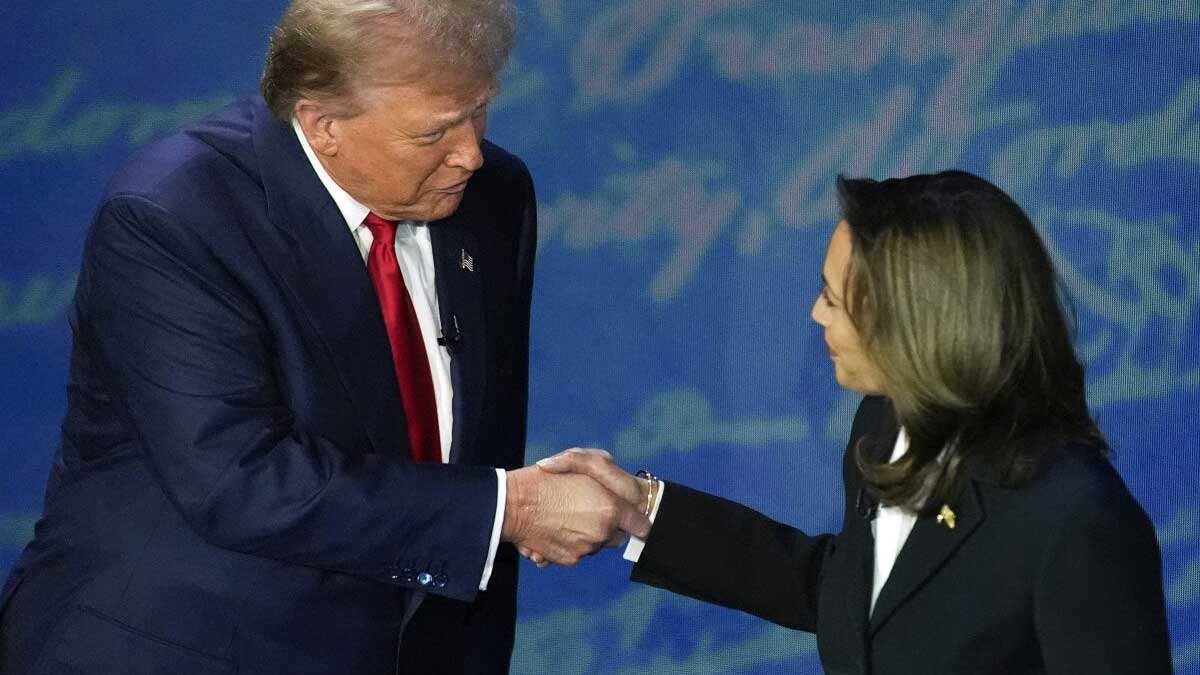- Home
- Billionaires
- Investing Newsletters
- 193CC 1000
- Article Layout 2
- Article Layout 3
- Article Layout 4
- Article Layout 5
- Article Layout 6
- Article Layout 7
- Article Layout 8
- Article Layout 9
- Article Layout 10
- Article Layout 11
- Article Layout 12
- Article Layout 13
- Article Layout 14
- Article Sidebar
- Post Format
- pages
- Archive Layouts
- Post Gallery
- Post Video Background
- Post Review
- Sponsored Post
- Leadership
- Business
- Money
- Small Business
- Innovation
- Shop
Recent Posts
Trump Refuses Further Debates with Harris After First Faceoff

In a surprising move, former President Donald Trump recently announced he will not participate in any more debates for the remainder of the current election cycle. This announcement came just two days after his first debate with Vice President Kamala Harris, which according to a recent poll, most voters believe Harris won. Trump, known for his competitive nature and combative debate style, cited reasons that raise eyebrows among political commentators and observers.
Trump, in his statement, said that all the critical issues involving “Kamala and Joe (Biden)” were already addressed during the first two debates—one with President Biden and the other with Harris. “There’s no need for a third debate,” Trump asserted, suggesting that these encounters had covered all the significant ground. While the debates in question covered a range of important topics, from economic policy to foreign relations, Trump’s refusal to engage in a third debate has sparked widespread discussion about his strategy for the remainder of the campaign.
Trump’s comments seemed to take aim at Harris in particular, with the former president accusing the vice president of dodging opportunities to engage in meaningful discourse. He alleged that Harris “was a no-show” at a debate hosted by Fox News, while also declining to participate in debates organized by NBC or CBS. Although the Harris campaign had previously indicated a willingness to engage in more debates, Trump’s remarks suggested a different interpretation of events.
The reference to Harris’s absence from a Fox debate is particularly puzzling, as no major reports support the claim that Harris skipped such an event. In reality, both the Trump and Harris campaigns had engaged in discussions about debate schedules, but no clear evidence backs Trump’s assertion that Harris intentionally avoided any debate platform. This discrepancy has led to speculation that Trump may be attempting to frame the narrative in a way that deflects attention from the challenges he faced during the recent debate.
Trump’s performance in the recent debate with Harris has become a major talking point. In the aftermath of the debate, Trump posed a rhetorical question to his supporters: “Why would I debate her again?” He further stated that he was “not inclined” to participate in another debate, claiming he had already “won” the debate against Harris. However, the poll results suggest that voters had a different perspective, with many favoring Harris’s performance over Trump’s.
The reaction from the Trump camp was somewhat mixed. Jason Miller, a senior adviser to Trump, left the door open to the possibility of another debate. Miller hinted that the responsibility to initiate further debates would fall on Harris, stating that “the onus” would be on the vice president to participate in a follow-up debate. This statement left some ambiguity about whether Trump was entirely closed off to the idea of another debate or if his refusal was a tactical maneuver in an ongoing negotiation over debate terms.
On the other side, the Harris campaign responded to Trump’s post by reiterating Harris’s previous stance on debates. Her team pointed to her earlier comments that welcomed another debate, suggesting that the vice president remained open to further public discussions. The juxtaposition of these statements highlights the contrasting narratives between the two campaigns and raises questions about whether a second debate could still be on the horizon.
Observers are now watching closely to see whether Trump’s decision is final. Given his unpredictable nature, it is not out of the realm of possibility that he could reverse his stance. In fact, weeks before the ABC-hosted debate, Trump had declared he was canceling his participation in that event, only to eventually show up. This history of changing his mind has led many to wonder if his current refusal to debate Harris again is merely temporary and subject to change based on future political developments.
Tuesday night’s debate between Trump and Harris was a significant moment in the current election season. Hosted by ABC, the debate marked the first time the two had faced off on the debate stage. It covered a range of pressing issues, including abortion rights, the economy, and the ongoing conflicts in Ukraine and Israel. The debate drew in a massive audience, with more than 67 million people tuning in, according to Nielsen ratings. This viewership marked a notable increase of around 18% compared to the earlier debate between Trump and Biden in June.
For Harris, the debate was seen as a success. Political pundits largely praised her performance, particularly for her ability to bait Trump into diverging from the core topics of discussion. Harris skillfully prompted Trump to defend his rally crowd sizes and legal challenges rather than focusing on the policy issues at hand. This strategy seemed to resonate with many viewers, who saw Harris as effectively keeping Trump on the defensive.
In contrast, Trump’s approach in this debate differed from his first faceoff with Biden earlier in the year. During that initial debate, many analysts and observers viewed Trump as the clear winner, leading to growing pressure on Biden to reconsider his campaign strategy. However, Trump’s more recent debate performance was less focused and allowed Harris to take control of several key moments.
The aftermath of the debate saw a shift in momentum, with many Democrats buoyed by Harris’s strong showing. For Trump, however, the decision to avoid further debates may be an attempt to consolidate his base and avoid additional confrontations that could weaken his position. Whether this strategy will prove effective remains to be seen.
Ultimately, Trump’s decision not to debate Harris again introduces a new dynamic into the election. While it is possible that he could change his mind and participate in another debate, his current stance suggests that the remainder of the campaign will focus on other avenues of communication. Both candidates are likely to continue addressing the critical issues that will shape the election, even if their direct engagements on the debate stage come to an end.
Recent Posts
Categories
- 193cc Digital Assets2
- 5G1
- Aerospace & Defense46
- AI37
- Arts3
- Banking & Insurance11
- Big Data3
- Billionaires449
- Boats & Planes1
- Business328
- Careers13
- Cars & Bikes76
- CEO Network1
- CFO Network17
- CHRO Network1
- CIO Network1
- Cloud10
- CMO Network18
- Commercial Real Estate7
- Consultant1
- Consumer Tech180
- CxO1
- Cybersecurity68
- Dining1
- Diversity, Equity & Inclusion4
- Education7
- Energy8
- Enterprise Tech29
- Events11
- Fintech1
- Food & Drink2
- Franchises1
- Freelance1
- Future Of Work2
- Games141
- GIG1
- Healthcare78
- Hollywood & Entertainment186
- Houses1
- Innovation42
- Investing2
- Investing Newsletters4
- Leadership65
- Lifestyle11
- Manufacturing1
- Markets20
- Media193
- Mobile phone1
- Money13
- Personal Finance2
- Policy567
- Real Estate1
- Research6
- Retail1
- Retirement1
- Small Business1
- SportsMoney33
- Style & Beauty1
- Success Income1
- Taxes2
- Travel10
- Uncategorized8
- Vices1
- Watches & Jewelry2
- world's billionaires418
Related Articles
Trump Moves $4B Stake in Truth Social Parent, Stock Drops 6%
Donald Trump recently transferred his 57% stake in Trump Media & Technology...
By 193cc Agency CouncilDecember 20, 2024House Rejects Trump-Backed Funding Bill, Shutdown Looms
The U.S. House of Representatives rejected a new government funding bill on...
By 193cc Agency CouncilDecember 20, 2024Trump Named Time’s Person of the Year for Second Time
On Thursday, Time magazine honored Donald Trump as its “Person of the...
By 193cc Agency CouncilDecember 12, 2024Meta Donates $1 Million to Trump’s Inaugural Fund
Meta, the parent company of Facebook and Instagram, has confirmed a $1...
By 193cc Agency CouncilDecember 12, 2024















Leave a comment